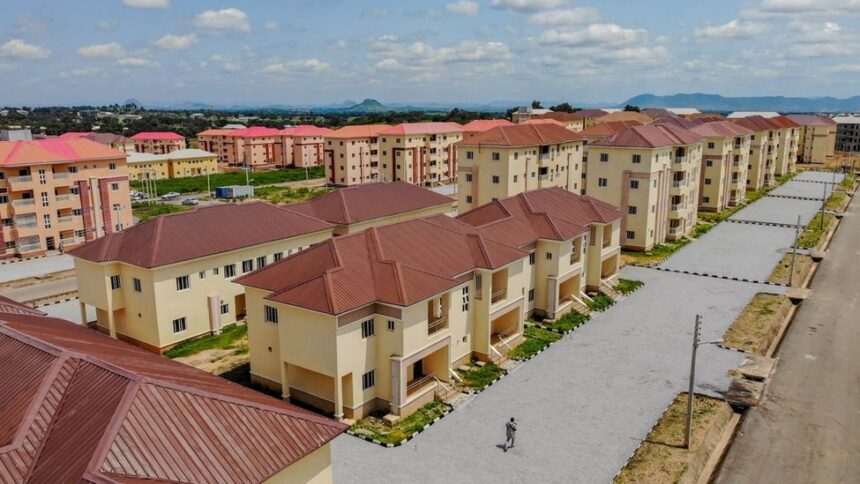Nigeria’s Federal Capital Territory is fast becoming one of Africa’s most attractive property markets, and the benefits of real estate here are hard to ignore. With a metro population growing at an estimated 4–5% annually and already surpassing 4 million residents, the city faces rising demand for both housing and commercial spaces.
This population boom is driven not only by internal migration from other Nigerian states but also by the influx of foreign diplomats, NGOs, and multinational companies that require modern residential and office facilities.
Infrastructure development is another powerful driver. The Federal Government’s renewed focus on expanding road networks, alongside the revived Abuja light-rail system and planned extensions, is making once-remote districts more accessible and valuable.
Improved transport corridors typically elevate land values and attract private development. These structural factors, population growth and transport improvements, are central to the measurable benefits of real estate in Abuja.
Price Trends and Rental Yields
Abuja’s property market has shown remarkable resilience and upward momentum, even amid national economic challenges. Market data reveal that certain neighbourhoods have seen year-on-year price increases of up to 39%, while citywide forecasts predict 8–10% annual growth through 2025.
High-demand districts such as Maitama, Asokoro, Gwarinpa, and Wuse consistently lead the appreciation curve, reflecting the premium placed on security, accessibility, and infrastructure in these areas.
For rental investors, the numbers are equally compelling. Current estimates place rental yields between 6% and 12% in prime locations, outperforming many fixed-income instruments when adjusted for inflation. Steady tenant demand, from civil servants, expatriates, diplomats, and corporate professionals, helps maintain low vacancy rates.
This combination of strong capital growth and reliable rental income underscores one of the most attractive benefits of real estate in Abuja: the potential for both consistent cash flow and long-term appreciation.
Economic Backbone and Stability
Real estate remains a critical pillar of Nigeria’s non-oil GDP, providing stability even during periods of economic uncertainty. Government infrastructure spending, supported by increased diaspora remittances and private-sector development, continues to inject capital into Abuja’s property market.
This macroeconomic foundation reduces investment volatility compared to many other asset classes.
Moreover, the property market offers investors a hedge against inflation and currency depreciation. As inflation erodes the value of cash holdings, well-selected real estate assets can preserve wealth and generate income in both naira and foreign currencies.
These factors highlight another key benefit of real estate in Abuja: its capacity to act as a dependable store of value and a buffer against broader economic headwinds.
Who Stands to Gain
Buy-to-Let Landlords: Abuja’s strong rental market, backed by a steady tenant pool of government employees, NGO staff, and private-sector professionals, ensures consistent occupancy and income.
For landlords, the predictable cash flow and attractive rental yields represent a clear benefit of real estate in the capital.
Capital Holders: Investors who focus on land banking or premium residential estates can benefit from significant long-term appreciation, especially as urban expansion drives up the value of centrally located plots.
Limited supply of titled land inside the city centre compounds this effect, making strategic acquisitions a strong inflation hedge, yet another benefit of real estate for patient capital investors.
Developers: The persistent demand for mid-market housing and purpose-built rental apartments creates opportunities for small- to medium-scale developers.
Those who deliver well-planned units with solid property management can enjoy both recurring rental revenue and capital gains, demonstrating how development itself can capture the multifaceted benefits of real estate in Abuja
Risks to Weigh Carefully
Despite the strong fundamentals, investors should not overlook potential risks.
Title and Regulatory Complexity: Abuja’s land tenure system requires meticulous verification of titles and Federal Capital Development Authority approvals. Skipping this step can result in costly disputes or loss of investment.
Liquidity Challenges: Premium properties and large plots may take time to sell, especially during market slowdowns.
Localized Oversupply: If speculative projects outpace genuine demand in certain suburbs, short-term oversupply can suppress rents and prices.
Working with reputable real estate professionals like Urban Shelter Limited, Edin and People Limited, Cosgrove Investment Limited, Bamboo Group, Bilaad Realty, insisting on thorough due diligence, and considering rent-producing properties can help investors secure the promised benefits of real estate while mitigating these risks.
What to Look for in Partnering with Agencies
To fully leverage the benefits of real estate, when choosing among these (or others), it helps to check:
Title & Documentation Quality: Ensures legal risk is low. Verified plots / properly registered deeds.
Project Delivery Track Record: How often does the agency meet deadlines? Are the finishings up to standard?
Payment Terms & Structuring: Having flexible payment plans or options can help cash flow.
Location & Infrastructure Access: Proximity to roads, amenities, transport corridors, this enhances appreciation and rental demand.
Maintenance / Management Services: Even after purchase or build, good property management keeps occupancy high, preserves value.
A Strategic Outlook
With its rapid population growth, ongoing infrastructure upgrades, attractive rental yields, and steady capital appreciation, Abuja presents a well-rounded investment opportunity. Prospective investors should conduct careful market analysis, factor in all transaction costs, and run yield and stress tests before making a purchase.
When approached strategically, the benefits of real estate in Abuja are both measurable and sustainable.
Whether you are a landlord seeking stable income, a developer aiming for recurring revenue, or an investor looking for a tangible hedge against inflation, the capital city stands out as one of Nigeria’s most promising frontiers for property investment.
Frequently Asked Questions (FAQs) About the Benefits of Investing in Real Estate in Abuja
What makes Abuja different from other Nigerian cities for real estate investment?
Abuja is Nigeria’s political and administrative capital, attracting diplomats, federal workers, multinationals, and NGOs. This steady influx of high-income residents creates consistent housing demand and supports strong rental yields. Combined with a population growth rate of around 4–5% annually and major infrastructure projects like the revived light-rail system, these factors deliver many of the measurable benefits of real estate, from long-term capital appreciation to reliable rental income.
What are the average rental yields and price growth rates?
Prime neighbourhoods such as Maitama, Asokoro, Wuse, and Gwarinpa typically offer rental yields in the 6–12% range, while city-wide property values have recorded annual price growth between 8–10%, with some micro-markets seeing higher double-digit jumps. These figures show how the benefits of real estate in Abuja can outperform many other asset classes when approached with sound due diligence.
Which areas in Abuja are best for investors seeking high returns?
High-demand districts like Maitama, Wuse II, Gwarinpa, and Jabi offer strong rental markets and premium appreciation potential. Emerging suburbs near new transport corridors, such as the Abuja light-rail routes, are also drawing attention for their future growth prospects. Location choice is key to fully realizing the benefits of real estate in the capital.
What are the main risks and how can they be managed?
Key risks include unclear land titles, occasional market liquidity issues, and localized oversupply in certain new estates. Investors can protect their investment by verifying titles with the Federal Capital Development Authority (FCDA), working with reputable agencies or developers, and factoring in a conservative vacancy allowance. Proper due diligence helps ensure the promised benefits of real estate are not compromised.
Which real estate agencies can help me invest safely and profitably?
Notable agencies and developers in Abuja include Edin & People, Bamboo Group, Urban Shelter Limited, Cosgrove Investment Limited, and Bilaad Realty. These firms offer services ranging from verified land sales and property management to full-scale development projects, making it easier for investors and landlords to tap into the many benefits of real estate while reducing legal and operational risks.
Join Techparley Africa’s free media exposure for your tech-enabled projects on #Drive100






